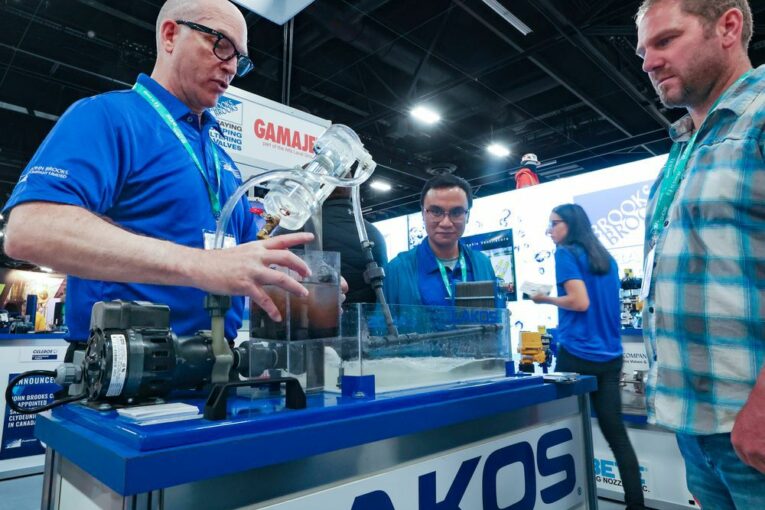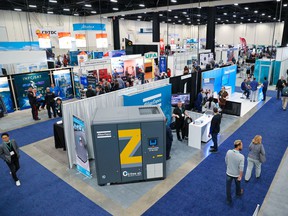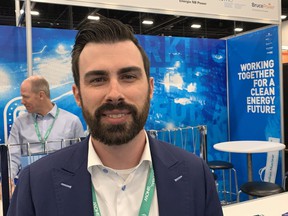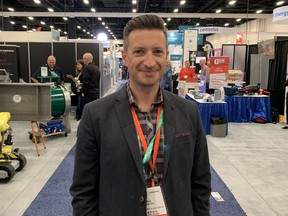
The Global Energy Show is back after three years and operating in an environment completely different than the last time the three-day industry conference ran in 2019.
Conversations have shifted from what could be done to what is being done to achieve cleaner energy, while oil and gas have gone from recession and recovery to booming with a global demand the industry is having difficulty meeting.
The show kicked off on Tuesday at the BMO Centre on the Calgary Stampede grounds talking about the role the industry can play in reconciliation with a keynote address from former minister of justice and attorney general of Canada Jody Wilson-Raybould.
She noted the relationship between oil companies and First Nations has come a long way, but there is work that still needs to be done and partnerships formed. These actions, however, cannot happen independently of other efforts and groups, nor can people expect issues to be legislated away or entirely solved through the courts. It’s about finding a way forward together, using people who can build bridges between Indigenous and non-Indigenous factions of society, who she calls “in-betweeners.”
“The energy sector, I think, can lead the charge in being in-betweeners,” said Wilson-Raybould. “You are on the ground, in community, touching directly what is vitally important to Indigenous people — their land and resources, the environment.”
She said the energy sector is already proving to be an instrument of reconciliation, by helping bring communities out of poverty. It is a tangible substantive shift that goes beyond the symbolism of lowering a flag or wearing a shirt that so many fall back on.

Green, or greener, energy is a major theme at this year’s conference. Even with the return of high oil prices and increasing demand, Alex Pourbaix, CEO of Cenovus, said progress must and will continue in the transition to net-zero emissions for the industry. He sees the role Canada can and should play in meeting global energy demands but also being at the forefront of clean oil and gas.
He said Cenovus’ goal is to reduce emissions by 35 per cent by 2030 and to be eliminated by 2050 through a number of different initiatives, including Pathway to Net Zero, which involves continuously evolving technology, carbon capture utilization and storage and the potential to shift to small nuclear reactors to power major projects.
“We are at the centre of ethical production of oil, I would argue in the world, and you now have all of the main players in this industry, committing to decarbonize that source oil,” he said. “I have no idea how much oil is going to be needed 50 years from now. … But I can tell you if we’re able to crack this nut on decarbonization, I think we have an incredibly strong claim that the last barrel of oil pumped in the world should be Canadian oil.”
Riley Found, senior adviser of strategic initiatives for the Canadian Nuclear Association, said there is no silver bullet technology that is going to alleviate Canada’s growing energy demands. It’s not going to be done entirely through wind and solar, or hydro, or natural gas, or even investment in nuclear. It’s going to take contributions from all of these options.

He said one of the big challenges is educating the public, which is a challenge for nuclear as they dig themselves out from decades of Homer Simpson causing meltdowns on TV or Hollywood wheeling around barrels of nuclear waste in movies. This conference is an opportunity for them to have those direct conversations with people.
“Nuclear is the only energy type that can tell you where the waste is, it’s in the ground, it’s controlled, it’s monitored, we know where every ounce of our waste has gone, and no other energy type can say that,” said Found from the CNA’s booth in the sprawling trade show. “It’s clean, it’s safe and we’ve got a great track record.”
Paul Krawchuk, a director for the Canadian Heavy Oil Association, said the show is an opportunity for them to talk with the public and to promote Canadian oil and gas as some of the cleanest in the world.
“I believe that Canadian heavy oil is going to see a bit of resurgence,” he said. “What the companies in the oil sands and heavy oil in general are trying to do in Canada I think is really leading-edge, as far as environmental performance.”

He added with the growing concern over energy security, Canada is becoming more attractive to the global market and he senses a lot more optimism in the industry.
Mayor Jyoti Gondek said the conversations that are going to take place at the show through Thursday will be critical to the future of Calgary. She said the city has taken the idea of energy transformation to heart as evidenced by the speed in which this shift has taken place, and the commitment from all corporate actors to work collectively to find solutions.
“We have long been leaders in transforming the energy economy and this is our chance to shine in front of global leaders,” she said.
The 2019 show had a direct $45 million impact on the city of Calgary and its return is a big signal to the rest of the tourism sector about the city’s position for recovery.
“The bigger play, for me, is making sure the people who come here, return here,” she said. “Not only to have other events here, but to bring their family here as well and to potentially relocate their business here.”
Twitter: @JoshAldrich03
You can read more of the news on source

